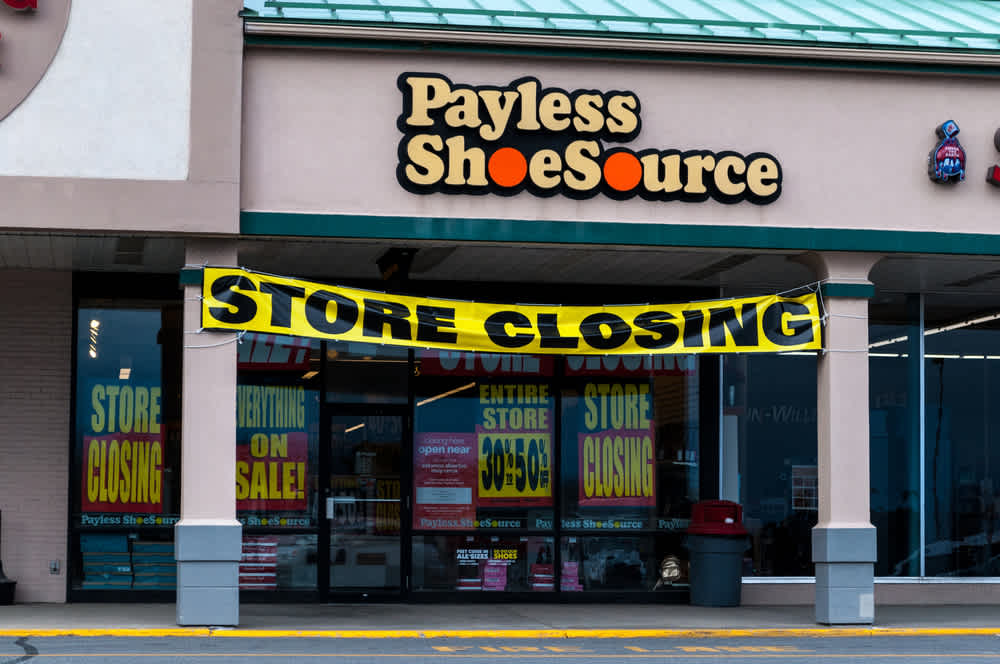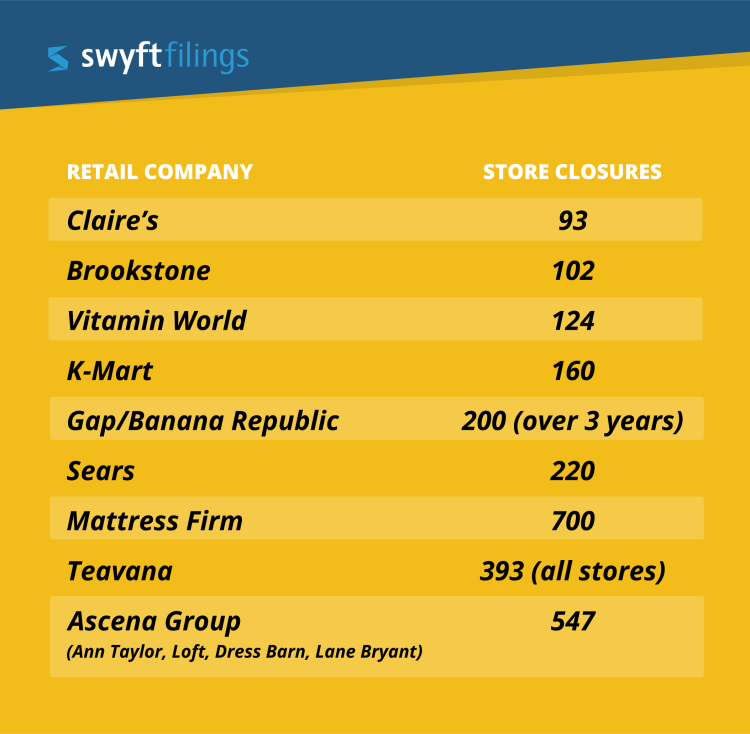Why Some Brick & Mortar Giants Aren't Making It


Swyft Filings is committed to providing accurate, reliable information to help you make informed decisions for your business. That's why our content is written and edited by professional editors, writers, and subject matter experts. Learn more about how Swyft Filings works, our editorial team and standards, what our customers think of us, and more on our trust page.
Swyft Filings is committed to providing accurate, reliable information to help you make informed decisions for your business. That's why our content is written and edited by professional editors, writers, and subject matter experts. Learn more about how Swyft Filings works, our editorial team and standards, what our customers think of us, and more on our trust page.
The retail industry in the United States has been experiencing some upheaval over the past few years. Even with the current favorable climate conditions (growing economy, high consumer confidence, low unemployment), many major retail companies are closing some/all of their stores and filing bankruptcy. 2018 buzzed about the closing of America’s beloved toy store, Toys-R-Us. This year, Payless Shoes announced its intention to close all retail stores in the United States and Puerto Rico, leaving on 1,500 locations out of its once 3,600 store global empire.
Sadly, the discount shoe seller is not the only brick and mortar who is in trouble. The following list shows retail corporations who have closed or are set to close stores in the near future:

The Primary Reason for Business Closure
While the immediate knee-jerk reaction may be to direct blame towards the growth of the e-commerce industry, and particularly Amazon, there are other contributing factors that must be considered.
In fact, based on data from the U.S. Department of Commerce, roughly 9% of all retail sales in 2017 were attributed to online businesses. In dollar amounts, e-commerce contributed approximately $450 billion to the $5 trillion retail money pot. E-commerce is certainly growing, but it is not quite the terrible villain that appears to be stealing sales from the rest of the retail industry.
Too Much Debt
The 2018 shutdown of Toys-R-Us served as an apparent preview of retail tragedies to come. At the time of its closure, the toy retailer held over $6 billion in debt. The issue that retail companies are currently facing is not only lost sales to online retailers, but rather the monstrous debt that looms over many corporations.
Recent data from Moody’s and Fitch Ratings shows $4-$5 billion in debt that is set to mature over the next five years. Almost $2 billion came due in 2018, prompting another wave of store closures amid bankruptcy filings. When Toys-R-Us failed to refinance part of its debt, the only other option was to close.
Interestingly enough, many of the companies that are shutting down are owned by private equity firms — Mattress Firm, Neiman Marcus, Claire’s, Toys-R-Us, Nine West, Payless, and Gymboree. Research shows that 15% of all retail companies bought by private equity firms have since filed for Chapter 11 bankruptcy.
Claire’s was one such company who was forced to file for bankruptcy in 2018 after reduced sales left it unable to handle its $2.1 billion debt. Having already closed 166 stores in 2016, the ear-piercing retailer shut down 130 more stores before September 2018.
The fall of Toys-R-Us had a more direct impact on Claire’s than other retailers since the tween jeweler sold some of its products through Toys-R-Us; Claire’s garnered $60 million in revenue in 2017 through its partnership with the toy merchant.
Another smaller additional concern includes store credit accounts, especially those issued by retail.
Don’t wait to drown in debt. Evaluate your finances, or dissolve your business.
The Hits Keep On Coming - Cyclical Effects of Debt
Lower sales against the mountain of debt created a perfect storm that led to the shuttering of 9,000 stores across the retail industry. Industry experts predicted an even higher number of closures in 2018 — close to 12,000.
The ripple effect of so many closures translated to 145 million square feet of vacated retail space. In simpler terms, it is 3,329 acres, 5.2 miles, or roughly 3,100 football fields.
In addition to all of the empty commercial space, there is also the loss of jobs for the thousands of retail workers. The retail industry currently employs approximately 8 million salespeople and cashiers and is one of the largest employers among the U.S. industries. The Toys-R-Us shutdown alone ended 30,000 retail jobs.
Other store closures due to bankruptcies in 2018 affected almost 31,000 workers. The recent holiday season may have helped some displaced retailer employees find work through Christmas; however, that was only a temporary fix and reports showed holiday hiring had decreased by 55% from the previous year.
Judging the E-Commerce “Threat” Matrix
Even though statistics show that e-commerce only makes up 10% of total retail sales, there is more to the whole picture when you look from macro to micro. Depending on the type of retail business, online vendors and shopping may or may not be a concern.
Consider grocery stores — Amazon may offer shelf stable items through their Prime Pantry, but consumers still need to purchase refrigerated and fresh foods at a physical location. Online sales at a clothing store, on the other hand, may account for up to 20% of the company’s revenue and that’s a big deal. Losing even 5% of those sales to an online competitor can have a noticeable impact on the business.
Additionally, the simple stats on e-commerce does not take into account how much of that business is handled by stores with a brick and mortar presence (i.e. Macy’s, Kohl’s, Target). Amazon may be big, but it’s not taking all of the online business.
The Changing Winds of the Retail Industry
While there may be some concern that brick and mortar stores are a dying breed, the end is not on any horizon in the near or distant future. Retail companies who have learned to adapt to the “changing of the guard” in its prominent customer base (from Baby Boomers and Gen-Xers to Millenials and Gen-Zers) are surviving the turbulent changes.
The potential “new” face of retail is more like an omnivore, offering both physical and online shopping experiences. For all its greatness in the e-commerce ‘verse, Amazon made some roads into the brick and mortar realm when the online giant opened “pop up” stores in malls across the country in 2016. Amazon stepped further into the physical retail world with its 2017 purchase of Whole Foods.
Wal-Mart and Target are among the stores that offer online purchase and in-store pick-up, as well as delivery of online purchases to customers. Kohl’s, Macy’s, Bed, Bath, & Beyond, and Home Depot also allow customers to make purchases online and pick up the items in a physical store.
Even though it looks like the mighty(s) have fallen, the retail industry as a whole is still moving forward and learning how to adapt to all of the changes.
Related Articles:
Swyft Blog
Everything you need to know about starting your business.
Each and every one of our customers is assigned a personal Business Specialist. You have their direct phone number and email. Have questions? Just call your personal Business Specialist. No need to wait in a pool of phone calls.




